Live Streaming
Program Highlight
Company Profile

Program Highlight (3016)

PLN Gradually Recovers Electricity Supply (0)
State-owned electricity firm PT PLN has recovered electric power to Balaraja Extra High Voltage substation in Banten Province, and furthermore it will be channeled to Suralaya steam-fueled power plant (PLTU) to gradually recover its operation to reach its capacity of 2800 MW of electricity.
In addition, power supply from Gandul Extra High Voltage substations in Depok, West Java Province, will be channeled to Muara Karang gas and steam power plant (PLTGU) to supply electricity to the Indonesian capital city, Jakarta.
Acting President Director of PLN Sripeni Inten Cahyani said here on Sunday that the power supply to Jakarta was expected to recover within three hours.
"We apologize for the inconvenience today, and currently all efforts have been made to recover the Java-Bali power system, especially in the area of West Java, Banten, and Jakarta," Cahyani said.
The company has focused on power supply to PLTGU Muara Karang and PLTGU Priok to recover the system in the capital city.
Previously, PLN has recovered the operation of hydro-generated power plant (PLTA) Saguling and PLTA Cirata which are functioned as power stabilizer, and, at the same time, supply the electricity to PLTU Suralaya through Cibinong, Depok, Gandul, Lengkok, Balaraja and Suralaya extra high voltage substations.
PLTU Suralaya is expected to return to its normal operation within six hours to normalize power system in West Java and Banten.
Blackout that affected thousands of homes and public facilities in West Java, Jakarta, and Banten was caused by several troubles in the extra high voltage 500 kV transmission of Ungaran - Pemalang.
"PLN has taken its best efforts and will have evaluation to prevent recurrence of today's incident," Cahyani said.
more news
December
Indonesia Fosters Advancement of Multilateralism, Connectivity at ASEM
Written by Ani Hasanah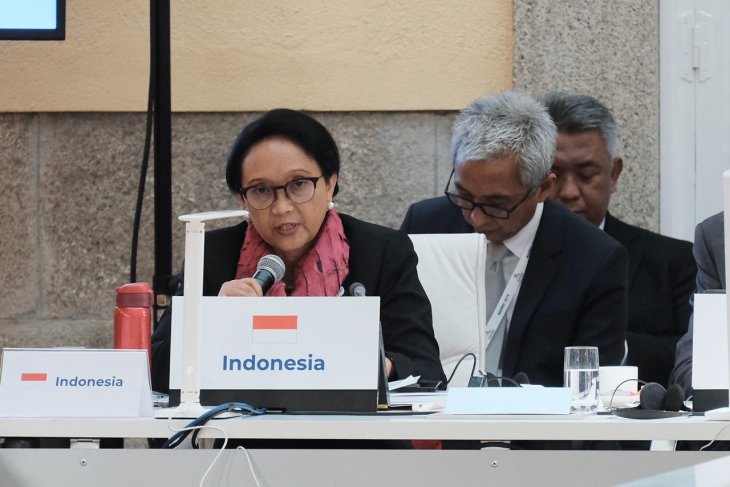
Indonesian Foreign Minister Retno Marsudi addressed the 14th Asia-Europe Ministerial Meeting in Madrid, Spain, on Monday (Dec 16, 2019) ANTARA
Indonesian Foreign Minister Retno Marsudi endorsed the promotion of connectivity and multilateralism at the 14th Asia-Europe Ministerial Conference that began in Madrid, Spain, on Monday (Dec 16).
"Asia and Europe must better promote sustainable connectivity," Marsudi noted in a written statement released on Tuesday.
At the plenary meeting of ASEM foreign ministers, Marsudi put the spotlight on the strategic outlook in creating sustainable connectivity, especially in an era replete with uncertainty.
From ASEAN’s experience, the regional grouping's strategic outlook has helped in creating the ASEAN community related to dialog and cooperation values. The values have laid down the foundation for the initiative of the ASEAN Outlook on Indo-Pacific (AOIP), she remarked.
"Asia and Europe must strengthen the strategic outlook that promotes collaboration, inclusive and open economy, and mutually beneficial paradigm," she stated.
At the retreat session, the Indonesian foreign minister reiterated the significance of maintaining cooperation and the principles of multilateralism to tackle a barrage of global issues, including Palestine and sustainable development goals (SDGs), including palm oil that has aided efforts to purge poverty in Indonesia.
During her visit to Madrid, Marsudi also held bilateral talks with foreign ministers of Austria, Bangladesh, China, and Kazakhstan; ASEAN secretary general; and state secretary of the Swedish prime minister.
The ASEM foreign ministers’ meeting themed “Asia and Europe: Together for Effective Multilateralism” discussed an array of issues encompassing multilateralism, gender equality, counterterrorism, maritime security, and cyber security. (ANTARA)
December
President Targets 14-Percent Reduction in Stunting Rate in Five Years
Written by Ani Hasanah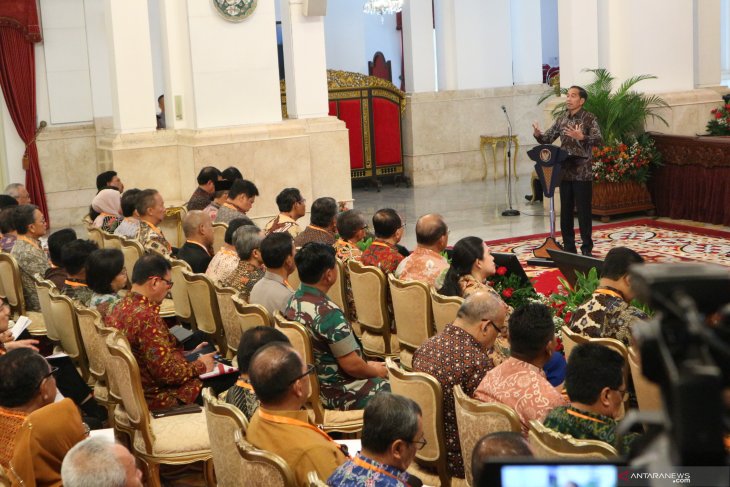
President of Indonesia Joko Widodo delivered a speech on reducing stunting or chronic hunger prevalence in the country at the launch of the deliberation on the national medium-term development plan (RPJMN) for 2020-2024 period at the Presidential Palace in Jakarta, Monday (Dec 16, 2019). (ANTARA)
President Joko Widodo is zeroing in on reducing the prevalence of stunting or chronic hunger in Indonesia by at least 14 percent in the next five years to improve the quality of Indonesian human capital. President Widodo remarked at the launch of the deliberation on the national medium-term development plan (RPJMN) for the 2020-2024 period at the Presidential Palace, Jakarta, Monday. Following his targets, the president reiterated the significance of feeding nutritious meals to children and students in schools. Apart from nourishing meals, President Widodo also prompted local governments to reduce the maternal mortality rate. The Indonesian government has outlined a target to reduce the prevalence of stunting to under 20 percent by 2024. In the past, a large number of cases of chronic hunger had been observed in several provinces, including East Nusa Tenggara and East Java. (antara)
President Joko Widodo Wants to Open Investment for Imported Substitution Goods
Written by Ani HasanahPresident Joko Widodo re-emphasized the importance of reducing import figures in a bid to maintain positive economic growth. When opening a Limited Cabinet Meeting on the Acceleration of the Implementation of the Industry and Trade Program at the State Palace in Jakarta, Wednesday (11/12), he highlighted the high number of imports of raw materials and auxiliary raw materials reaching more than 70 percent. Data from the Central Statistics Agency shows that imports of raw materials and auxiliary raw materials reached 74.06 percent of the total imports for the period January to October 2019. Meanwhile, imports of goods and imports of consumer goods reached 16.65 percent and 9.29 percent respectively. Of this figure, the type of raw material with the highest number of imports is steel, reaching US$ 8.6 billion dollars. Meanwhile, the organic or petrochemical chemical industry reached US$ 4.9 billion dollars. Thus, President Joko Widodo hopes that his aides will open up investment opportunities, especially for the substitute goods industry.
“ Moving on from the data, I ask for investment opportunities, please underline this, the import substitution industry must be wide open. That means that steel, chemical or petrochemical industries must really be opened. Becausethis is an import substitution. This should be noted by BKPM (Investment Coordinating Board). So, the notes are Coordinating Minister for Maritime Affairs and Investment," said Joko Widodo.
Furthermore, President Joko Widodo also asked his aides to take concrete steps to encourage the growth of the processing industry, petrochemicals, including the acceleration of the mandatory biodiesel B30. He emphasized that the growth of the manufacturing industry not only produces imported substitutes, but also opens up huge employment for the community. In addition, President Joko Widodo also called for an increase in the campaign for the use of domestic industrial products, including the optimization of the Domestic Component Level in government projects so that import figures can be suppressed. (VOI/Ndy)
December
Jokowi Stresses on Raising Financial Literacy to Boost Micro Economy
Written by Ani Hasanah
resident Joko Widodo delivered his speech at the meeting of the national team on acceleration of regional financial access (TPAKD) in Jakarta on Tuesday (Dec 10, 2019). ANTARA
President Joko Widodo (Jokowi) has put his weight behind improving financial literacy and inclusion among Indonesians to access banking services to drive micro economic growth.
"This is crucial since from here we can improve the family's economy, our micro economy," Jokowi remarked during a coordination meeting of the national team on acceleration of regional financial access (TPAKD) in Jakarta on Tuesday.
The head of state is upbeat about the Financial Services Authority (OJK) improving financial literacy and inclusion through the formation of the TPAKD to encourage the people to put their money in banks as savings and seek loans from financial institutions.
"We want all regions to encourage people to access financial services. We have to accelerate this," Jokowi affirmed.
Head of the OJK Board of Commissioners Wimboh Santoso remarked that the agency closely collaborated with the government to step up access to financial services for people through the role of TPAKD and the development of Micro Endowments Bank (BWM).
"Efforts to improve access to financial services has become OJK's priority along with Bank Indonesia and the local as well as central governments, as financial access has been closely linked to the development of public welfare and funding for national economic development," Santoso remarked.
Increased access to financial services will boost investment and public savings in banks that will further increase loan disbursement to support economic activities.
"Establishment of the TPAKD is expected to support the government's priority programs, especially in the development of new economic centers in regions, such as the export-oriented industry and tourism industry," he stated.
Until November 2019, the government had set up 164 TPAKD at the provincial and district levels that implemented various programs to improve access to financial services.
As of October 2019, the disbursement of micro loans (KUR) had reached Rp127.3 trillion, or 90.9 percent of its targeted Rp140 trillion for 2019; some Rp31.9 trillion of loans in the fishery sector under the Jaring Program; while the Laku Pandai Program had collected Rp2.21 trillion of public savings from 25.8 million people across the country.
The Simpel Program accrued Rp8.76 trillion of public savings from 21.6 million students in 350 thousand schools. (ANTARA)
December
Jokowi Highlights Economy-Boosting Pointers for Agriculture-Fisheries
Written by Ani Hasanah
President Joko Widodo speaking during a meeting themed "Economic Strengthening Acceleration in the Agriculture and Fisheries Sector" at the Presidential Office in Jakarta, Tuesday (10/12/2019).(ANTARA)
President Joko Widodo (Jokowi) drew attention to three areas to enable the agriculture and fisheries sectors to drive Indonesia's economic growth.
"Firstly, our attention had only been focused on the efforts to increase agriculture and fisheries products at the 'on farm' level. We never touch the 'off farm', especially the post-production side," he remarked at the Presidential Offices in Jakarta, Tuesday.
President Jokowi made the statement during a meeting themed "Economic Strengthening Acceleration in the Agriculture and Fisheries Sector," in which the attendees also comprised Vice President Ma'ruf Amin and cabinet ministers.
The president expressed belief that farmers and fishermen should go beyond on-farm activities to off farm through providing added value to farming and fisheries activities by processing their products as well as developing agriculture and fisheries-based businesses.
"Secondly, in order to get to the off farm activities, farmers and fishermen need financing schemes and coaching," he pointed out.
In terms of financial schemes, the government has already established a people's business credit scheme (KUR) wherein the budget ceiling will be Rp190 trillion in 2020, with a six-percent interest.
"I have ordered the KUR to be designed with special schemes per cluster, so that it meets the needs of the grace period for the production of agricultural and fisheries clusters," he stated.
However, he highlighted that financing schemes must be followed by coaching for adequate financial management along with preparing good packaging and branding as well as sound marketing.
"Thirdly, we must start encouraging our micro, small, medium businesses; our farmers; our fishermen, who have been moving on small-scale economies to join in and collaborate with large groups or corporations, so that they have a larger economic scale," he remarked.
Thus, farmers and fishermen can be more effective in obtaining raw materials, accessing working capital and investment, and making efforts to market their products, so they can enter the national and global supply chain.
The three notes were highlighted by President Jokowi taking into account that the fisheries sector has an important and strategic role in improving the welfare of Indonesians.
"I see fisheries and agriculture as very important and strategic sectors. This is not only because they provide food for more than 260 million Indonesians but also since they are able to accommodate a large workforce and contribute significantly to improving the people's welfare and reducing poverty," he stated.
Hence, he called for breakthrough steps for the two sectors for broader growth and becoming a driving force of the nation’s economy. (ANTARA)
December
VP Receives Two Concepts of Sharia-Compliant Economy
Written by Ani Hasanah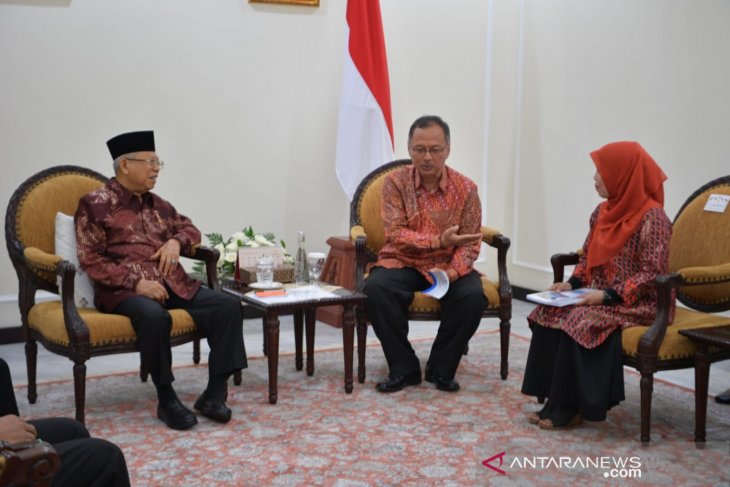
Vice President Ma'ruf Amin received Rector of Malang-based Maulana Malik Ibrahim State Islamic University (UIN) Abdul Haris, at the Vice Presidential Office in Jakarta on Tuesday. (Secretariat of the Vice Presidential Office)
Vice President Ma'ruf Amin received two concepts of developing a sharia-compliant economy through rural areas and Islamic boarding schools (pesantren) from Maulana Malik Ibrahim State Islamic University (UIN) in Malang, East Java, Tuesday. The involvement of the rural community and pesantren can support the conventional economy which has been running well, Abdul Haris, rector of UIN Malang said at the Vice Presidential Office.
"This will greatly help the development of a sharia-compliant economy as a whole. It will not contradict conventional businesses but will complement each other," Haris said.
The development of the two concepts can increase domestic production of halal goods which have become the ideals of the Vice President to utilize them optimally.
The strategy of developing the two concepts of sharia economy involves five related community groups called pancahelik. They are the government as a regulator, the community as an object of development, institutes of higher learning as a training provider, and businessmen and the banking institutions, he said.
"At the UIN Maulana Malik Ibrahim campus, we have started (the concept). Some of the programs are integrated with Tri Dharma, research, education and dedication," he said.
During the meeting, the UIN Malang rector also revealed about the management of alms being used as loans for the community to strengthen the business capital. To date, UIN Malang has channeled loans to residents of 12 villages, equivalent to some 1,500 micro, small and medium businesses (UKM), he said.
"UIN Malang has collected profession alms used as interest-free loans for micro, small and medium businesses. The amount of loans is small with the maximum amount being Rp10 million. Most of the loans amount to Rp2 to 3 million," he said.
At the meeting, the Vice President asked UIN Malang and other institutes of higher learning to develop a people-based economy that could encourage the growth of private businesses in the community. (ANTARA)
December
President Jokowi Prepares Tuberculosis Control Regulation
Written by Ani Hasanah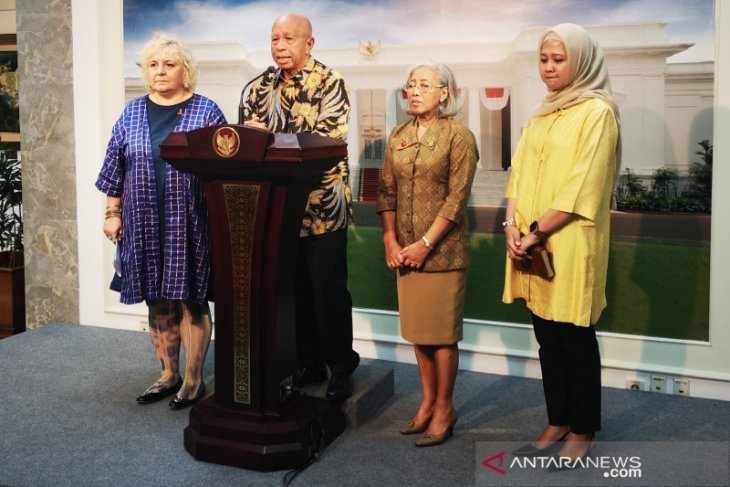
Chief of the Stop TB Partnership Forum for Indonesia (FSTPI) Arifin Panigoro, along with Executive Director of Stop TB International, Lucica Ditio (left) held a press conference following a meeting with President Joko Widodo at the Merdeka Palace in Jakarta on Monday (9/12/2019). (ANTARA)
President Joko Widodo (Jokowi) is preparing a regulation to combat tuberculosis (TBC) in Indonesia, according to Chief of the Stop TB Partnership Forum for Indonesia (FSTPI) Arifin Panigoro.
"One point highlighted by (the president) to ensure smooth cooperation among ministries and institutions is that he is preparing a presidential regulation on combating TBC," Panigoro stated following a meeting with President Jokowi at the Merdeka Palace in Jakarta on Monday.
Through the presidential regulation, not only the Health Ministry but also the Home Affairs Ministry and other relevant ministries can partake in efforts to eradicate TBC, he remarked.
"As we all know, regions in Indonesia have a strong autonomy, so regional heads, including governors and district heads, play a very important role," he noted.
As a civil organization, the FSTPI remains resolved to fight TBC in Indonesia, he emphasized.
"What we are doing is only combating TB or TBC. We will report this to the presidents of Indonesia, China, and India that bear witness to the largest number of TBC cases in the world, so they must be serious about combating it," he stated.
The Health Ministry is solely tasked with combating TB. However, in view of the large problems, the ministry will find it hard to work single-handedly, he pointed out.
"As a civil organization, we are really willing to help the government," he remarked.
The world has set a target of becoming TBC free in a decade’s time, or by 2030, he pointed out.
"This is no easy task to accomplish in Indonesia," he affirmed.
The global tuberculosis report published by the World Health Organization (WHO) indicated that no single country is free from the disease.
In 2017, an estimated 842 thousand Indonesians had contracted TB, caused by the mycobacterium tuberculosis virus, of which 23 thousand developed drug resistance to the disease.
Almost 75 percent of TB sufferers in Indonesia are from the productive age group.
The situation is a threat to fulfilling one of the agendas of the medium-term development plan 2020-2024 in which the country is striving to improve the quality and competitive edge of human resources.
TB is a global disease found in every country across the world. It is the leading infectious cause of death worldwide.
In 2018, an estimated 10 million people had contracted TB worldwide constituting 5.7 million men, 3.2 million women, and 1.1 million children. The cases transcended countries and age groups.
The WHO estimates that 1.8 billion people—close to one quarter of the world's population—are infected with Mycobacterium tuberculosis (M.tb). (ANTARA)
December
APEC Senior Officials Endorse Consensus for More Inclusive Growth
Written by Ani Hasanah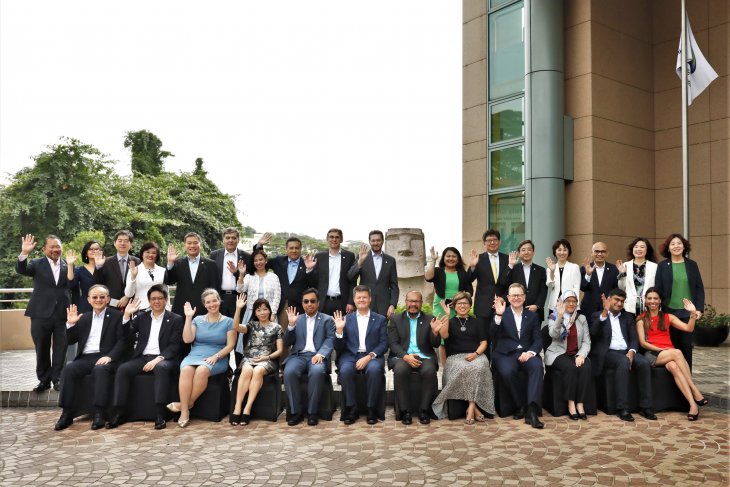
APEC Concluding Senior Officials’ Meeting held in Singapore on Saturday (December 7, 2019). (APEC Secreatriat)
Asia-Pacific Economic Cooperation (APEC) members will make concerted, sustained efforts in the path to achieving more inclusive and sustainable growth, APEC Senior Officials pledged at the concluding event for Chile’s host year of APEC.
At the APEC Concluding Senior Officials' Meeting, taking place at the forum’s Secretariat in Singapore, Chile put forth the three plans for collective action – or ‘roadmaps’ – that member economies agreed on during the year on key issues for regional prosperity.
These three plans pertain to the issues of women’s economic empowerment; marine debris; and illegal, unreported and unregulated fishing, according to a written statement issued by the APEC Secretariat and received Jakarta on Monday.
"The APEC enables our economies to foster and build consensus – and that’s critical for the region in times of challenges. At a time when the needs of our people are evolving, multilateral and regional fora, such as the APEC, can provide inclusive and sustainable solutions and create new opportunities for all our people,” 2019 Chair of APEC Senior Officials Mathias Francke remarked.
"Senior officials also focus on ways to deepen engagement with stakeholders," he stated.
Constituting 60 percent of the world’s gross domestic product (GDP) and half of the global trade, APEC’s 21 economies are vital to global economic growth.
The forum, marking three decades of cooperation, is one of the oldest and most resilient vehicles for economic collaboration and integration.
Francke noted that Chile’s host year was all about reverting to the essence of APEC -- or "back to basics" -- by promoting informal, open dialog between economies to advance complex issues. This approach enabled the forum to achieve important outcomes, including a consensus statement by the ministers responsible for trade.
Along with addressing the forum’s achievements and long-term vision, senior officials also pressed for action by the APEC Digital Economy Steering Group, formed earlier this year to spearhead the forum’s work on an increasingly critical sector.
A new APEC report on structural reform and the digital economy is also projected to serve as a guiding beacon for the region’s economies to garner greater benefits and better adapt to the fourth industrial revolution.
APEC Senior Officials also lauded the completion of the La Serena Roadmap for Women and Inclusive Growth that defines concrete goals and recommendations to reduce existing gaps between women and men in the Asia-Pacific. Chile is the first APEC economy to elevate women’s empowerment as a region-wide priority.
"To truly achieve inclusive growth, the APEC must ensure that everybody, including women and vulnerable groups, are able to fully participate in the economy and benefit from any progress. We thank Chile’s leadership in raising awareness on this pressing issue and vow to continue this important work," Rebecca Sta. Maria, executive director of the APEC Secretariat, stated.
Following the final meeting, led by Chile, APEC Senior Officials will convene in Langkawi, Malaysia, for the first events in the host economy for APEC 2020. (ANTARA)
December
President Welcomes World Stop TBC Action Delegation at Merdeka Palace
Written by Ani Hasanah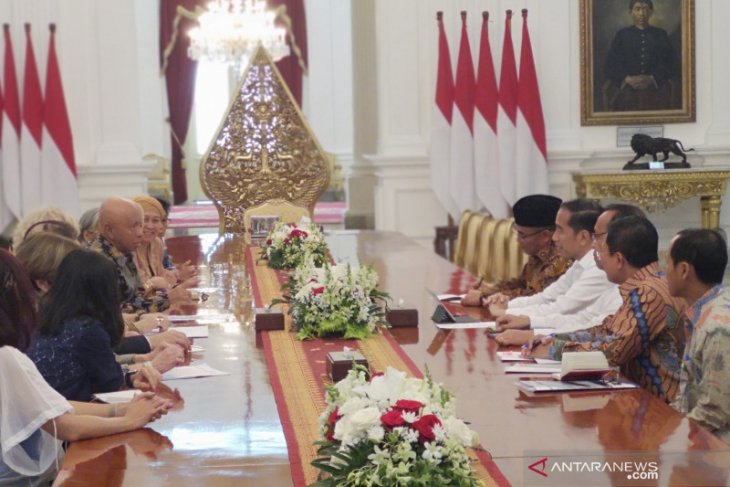
President Joko Widodo (Jokowi) received a delegation of the World Stop TBC Action at the Merdeka Palace in Jakarta on Monday. (ANTARA)
President Joko Widodo (Jokowi) received a delegation of the World Stop TBC Action at the Merdeka Palace in Jakarta on Monday.
At the meeting, Coordinating Minister for Human Development and Culture Muhadjir Effendy, Minister/State Secretary Pratikno, and Health Minister Terawan Agus Putranto accompanied President Jokowi, while the Stop TBC Action delegation was flanked by Chief of the Stop TB Partnership Forum for Indonesia (FSTP) Arifin Panigoro.
The global tuberculosis report published by the World Health Organization (WHO) showed that no single country is free from the disease.
In 2017, an estimated 842 thousand Indonesians had contracted TB caused by the mycobacterium tuberculosis, of which 23 thousand developed drug resistance to the disease.
Almost 75 percent of TB sufferers in Indonesia are from the productive age group.
The situation is a threat to fulfilling one of the agenda of the medium-term development plan 2020-2024 in which the country is striving to improve the quality and competitive edge of human resources.
TB is a global disease found in every country in the world. It is the leading infectious cause of death worldwide.
In 2018, an estimated 10 million people had contracted TB worldwide constituting 5.7 million men, 3.2 million women, and 1.1 million children. The cases transcended countries and age groups. (ANTARA)
Nadiem Makarim keen to give university students freedom to learn
Written by Wenny ZuliantiEducation and Culture Minister Nadiem Makarim spoke of his keen intent to give university students the freedom to learn in line with their aspirations, capabilities, and interests.
"University students should study in accordance with their respective wishes and interests. We must make this change," the minister noted in his remarks at the inauguration of the new rector of the University of Indonesia (UI) Prof. Ari Kuncoro at UI Campus, Depok, here, Wednesday.
The minister stressed on the need for university students to also have the freedom to conduct various activities beyond the realm of education programs.
A university capable of providing education to students plays a crucial role in realizing President Joko Widodo’s vision to produce sound human resources, he remarked.
"The president's vision has two interpretations, specifically freedom in learning and teachers as activators," he stated.
Streamlining regulations and bureaucracy are deemed necessary for freedom in study, from the lowest educational level until university, Makarim remarked.
"Within the next five years, indeed, it would not be convenient at all for various education institutions. However, the change must be brought about," he stated.
Speaking in connection with teachers and lecturers as the stimuli, Makarim said they would strive to seek knowledge and science to bring about improvements in learning activities in classes.
"He would not waste time in class. Hence, in class, he would organize a discussion or group study and implement various projects outside though by involving his students to enable them to have different experiences," he stated.
Teachers and lecturers should feel a sense of pride if their students are smarter than them, and they would not feel threatened, he remarked.
In the meantime, on Nov 19, while speaking at the commemoration of the 107th anniversary of Muhammadiyah, Indonesia's second-largest Muslim organization, Makarim voiced his commitment to freeing the country's education system to drive novel innovations in the education sector.
"In accordance with the president's directives, our mission in the Education and Culture Ministry is to free the education unit, to free teachers, and to free students. This is my commitment," he remarked.
Freedom is paramount to materializing innovations in every education unit.
To prepare future national leaders, the former boss of Gojek Internet technology-based company vowed to further promote character building education.
However, character building education cannot merely be taught but must be applied on an ongoing basis.
"Character education cannot be taught. The best character education is to give example and to lead by it," he noted.







